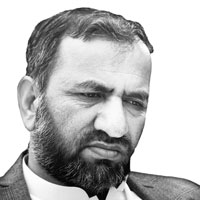In early 2008, Abu Yahya al-Libi was making the perilous cross-border journey into Afghanistan from his base in Pakistan’s North Waziristan tribal badlands. The al Qaeda ideologue was on his way to Khost province, hoping to rally al Qaeda and Taliban fighters there. But as his group crossed the dangerous and rugged frontier, the normally garrulous and upbeat Libyan grew quiet and seemed almost depressed, according to a senior Taliban intelligence officer who was with him. Sensing the mood change, the Afghan asked al-Libi what was wrong. “I don’t want to be killed by Pakistani or Afghan puppet soldiers of America,” the Libyan said. “If I die as a martyr, I want to be killed by the explosives and forces of the worst enemy of Islam, the U.S.”
Al-Libi’s wish has finally been granted. A few days ago he and roughly a dozen of his fellow militants were gathered in a mud-brick house when it was vaporized by Hellfire missiles launched from American drone aircraft flying above a small village near the North Waziristan town of Mir Ali. U.S. officials are calling al-Libi’s death a “major blow” against al Qaeda, which was already reeling from the loss of most of its top leaders, including Osama bin Laden himself. Thanks to those losses, al-Libi—already the terrorist group’s top ideologue and imam and arguably its most visible and charismatic speaker, rose to become al Qaeda’s second in command. Many people regarded him as a far more effective leader than the man who theoretically outranked him, the former Egyptian Army surgeon Ayman al-Zawahiri, who inherited al Qaeda’s No. 1 slot after bin Laden’s death 13 months ago.
Al-Libi’s death seems to have shaken al Qaeda militants and Taliban fighters nearly as much as bin Laden’s did. U.S. officials tend to focus on al-Libi’s role as a planner of attacks, a “general manager” who was responsible for al Qaeda’s day-to-day operations, and as a gatekeeper for those who wanted to see or communicate with the elusive and irascible Zawahiri. And it’s true that the Libyan was a dangerous operational planner. But he also presided over al Qaeda’s religious council, and his extremist admirers viewed him more as an inspirational leader and motivator than as a field commander. That fact will make him far more difficult for the terrorist group to replace than any of the No. 2’s and 3’s who preceded him. An Afghan Taliban logistics officer who has worked with al Qaeda in the past puts it this way: “Sheik al-Libi’s death is another big rock dropped on the head of Al Qaeda, which was already badly smashed after the death of Osama bin Laden.”
The Taliban intelligence officer, who often worked with al-Libi over the past five years, says no one—not even bin Laden—could inspire militants and attract new recruits better than al-Libi. “His vision and speeches touched us like no one else could,” says the Taliban officer. “He was emerging as al Qaeda’s new ideological and political leader.” Another Taliban commander who had met him was equally impressed. “He was the most impressive al Qaeda figure I’ve met,” he says. “He was a religious scholar as well as an expert on the Muslim world in Africa and the Middle East. When he talked, you couldn’t stop listening.” The intelligence officer vividly recalls al-Libi appearing at a militant camp in Pakistan’s tribal zone one morning at sunrise, wearing his trademark black turban and carrying a white flag. The Libyan had come to address a large gathering of militants and villagers on the eve of the Eid celebrations. “His impressive voice and spirit converted even the mountains of Waziristan,” the intelligence officer says.

Al-Libi’s fame soared when he made a daring, almost inexplicable escape with three other militants from the high-security lockup at Bagram Air Base in 2005, after three years in U.S. custody. He celebrated by making an hourlong video that was posted on Islamist websites and widely distributed on DVD, recounting his escape and calling for Muslims everywhere to rise up and establish the rule of Sharia. Over the next few years he would become al Qaeda’s most visible public face, appearing in more propaganda videos than either bin Laden or Zawahiri. As the Libyan revolution swept his homeland in March 2011, he produced a 30-minute video urging his countrymen to overthrow and kill Gaddafi. “We have to get rid of our inferiority complex and free ourselves from the West,” he declared.
By then he had been waging jihad for decades. After fighting in Afghanistan in the 1980s, he returned home to Libya and became a key leader of the radical Libyan Islamic Fighting Group in the 1990s, hoping to topple Gaddafi and set up an Islamic state. The regime ultimately crushed the rebellion, and al-Libi ended up back on the Afghanistan-Pakistan border, this time supporting the Taliban’s Mullah Mohammed Omar and bin Laden.
He had a knack for survival. On his 2008 trip to Khost, Afghan and U.S. forces attacked his group, recapturing one of the militants who had escaped from prison with him. But al-Libi somehow eluded capture or death. In 2009 Pakistani and U.S. intelligence announced that he had been killed in a drone strike. The reports were mistaken.
But al-Libi began pushing his luck during the Libyan revolution, Taliban sources say. As anti-Gaddafi forces pressed their attacks against the Libyan dictator’s troops, al-Libi took to dropping in at the homes of villagers in Waziristan to watch international news reports of the fighting via satellite television. His Taliban friends worried that the visits were putting him at risk of being located by American intelligence.
A similar lack of caution seems to have been what finally killed him. The meeting near Mir Ali was al-Libi’s own idea, says the Taliban commander, and the presence of so many outsiders in the village must have given him away. “These drones were covering every inch of Waziristan a few days back,” says the commander. “The Americans were looking for him.”
Afghans and Pakistanis often regard Arabs—and al Qaeda operatives especially—as arrogant and unfriendly. But al-Libi was different, they say. Several months before dying in combat in Afghanistan last month, a young Afghan al Qaeda fighter told The Daily Beast that al-Libi was the most remarkable al Qaeda leader he had ever met. “He was an amazing personality,” the young man said. “He was friendly, simple and brave.” The Afghan particularly liked how al-Libi refused to stand aloof or act as if he was boss. The Libyan even insisted on doing his own shopping in the tribal zone’s bazaars, much to the consternation of his security escorts. “He’d buy stuff for himself and others out of his own pocket,” the youngster said. “Everyone in the tribal area knew and liked him.”
None of which changes the fact that al-Libi was a radical jihadi, committed to violently imposing al Qaeda’s vision on the surrounding region and the West. No one but al Qaeda’s remnants and its stubborn sympathizers will shed any tears over his death.







